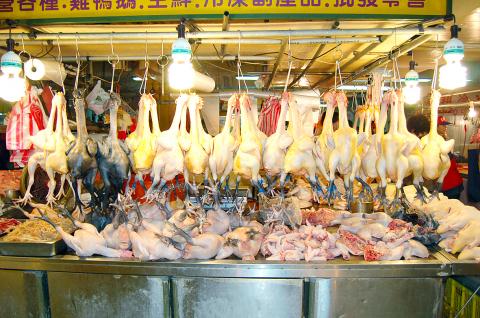Avian influenza has been confirmed on two farms in Pingtung County’s Wanluan Township (萬巒) and all 220,000 birds on the two farms will be killed today, the Council of Agriculture said yesterday.
An organic farm raising about 80,000 chickens for meat was hit by the highly pathogenic H5N8 bird flu strain, while samples from an egg farm tested positive for the H5 subtype, the council said.
Both farms are run by Dawushan Livestock Products Co, the same operator that reported the first case of H5N2 in Pingtung this year on Jan. 9.

Photo: CNA
In addition, the results of tests on the carcasses of three light-vented bulbuls (Pycnonotus sinensis) found near a slaughterhouse in Miaoli County’s Jhunan Township (竹南) last week showed the trio had the H5N3 strain — the fourth and most recently detected virus strain to be found in Taiwan during the current bird flu outbreak.
The Pingtung case was the second to be confirmed among chickens, after the newly discovered H5N2 strain was found on a broiler farm in Changhua County’s Shengang Township (伸港) on Sunday, while the bulbuls were the first birds known to be affected by the new bird flu strain.
The council yesterday ordered all slaughterhouses, poultry markets and farms nationwide to cease operations until Thursday so they could be thoroughly disinfected — including all vehicles and cages.

Photo: Chen Wei-jen, Taipei Times
Meanwhile, Environment and Animal Society of Taiwan (EAST) chief executive Wu Hung (朱增宏) said the council’s response was too slow, and that it should have suspended operations at such facilities after the first outbreak was reported almost three years ago on a layer chicken farm on Pingtung’s Dawushan (大武山).
A survey conducted by EAST found local authorities lack a standard culling method, Wu said, with some using chloral hydrate as an anesthetic before killing the fowl, while others kill the birds by freezing them with dry ice or suffocate them by stuffing them into bags.
The US of Department of Agriculture has banned the use of chloral hydrate during culls because it is a weak anesthetic, while freezing the animals with dry ice causes a painful death, Wu said.
Council of Agriculture Minister Chen Bao-ji (陳保基) said the council would reassess the culling methods used by local agencies and adjust them if necessary.
Despite the increasing number of bird flu outbreaks among chickens, Animal Husbandry Department division head Chiang Wen-chuan (江文全) said the impact on the nation’s poultry flocks has been limited, with about 410,000 chickens affected, or about 0.5 percent of the nation’s annual supply.
He said that geese have borne the brunt of the outbreaks, with about 416,000, or 30 percent of the nation’s total, culled as of yesterday morning.
The council’s latest statistics show that of the 274 facilities sampled so far, 239 tested positive for avian flu strains and culls have been conducted at 130, putting the total number of poultry affected by the outbreaks at about 528,000.
In related news, Yunlin County Agriculture Department Director-General Chang Shih-chung (張世忠) told a news conference in Taipei that his agency is desperately short of workers, as it receives more than 20 reports of possible infections per day and about 60 percent of the total number of geese in the region are on the council’s watch list.
The avian flu outbreak has swamped the three rendering sites in the county, which reached their capacity several days ago, Shih said.
Duck Association Taiwan deputy director-general Lin Chin-fa (林金發) said that 90 percent of his geese had died and it looks as if the rest will die soon.
Chen said the current outbreak is the largest in the nation’s history, and that the government would ease its compensation rules for farmers affected by the epidemic.
It will be at least three months before farms hit by the bird flu outbreak can resume operations, Chen said.
He also said local authorities would act swiftly to inspect goslings and urged members of the Goose Association Taiwan to help.

Taiwanese can file complaints with the Tourism Administration to report travel agencies if their activities caused termination of a person’s citizenship, Mainland Affairs Council Minister Chiu Chui-cheng (邱垂正) said yesterday, after a podcaster highlighted a case in which a person’s citizenship was canceled for receiving a single-use Chinese passport to enter Russia. The council is aware of incidents in which people who signed up through Chinese travel agencies for tours of Russia were told they could obtain Russian visas and fast-track border clearance, Chiu told reporters on the sidelines of an event in Taipei. However, the travel agencies actually applied

New measures aimed at making Taiwan more attractive to foreign professionals came into effect this month, the National Development Council said yesterday. Among the changes, international students at Taiwanese universities would be able to work in Taiwan without a work permit in the two years after they graduate, explainer materials provided by the council said. In addition, foreign nationals who graduated from one of the world’s top 200 universities within the past five years can also apply for a two-year open work permit. Previously, those graduates would have needed to apply for a work permit using point-based criteria or have a Taiwanese company

The Shilin District Prosecutors’ Office yesterday indicted two Taiwanese and issued a wanted notice for Pete Liu (劉作虎), founder of Shenzhen-based smartphone manufacturer OnePlus Technology Co (萬普拉斯科技), for allegedly contravening the Act Governing Relations Between the People of the Taiwan Area and the Mainland Area (臺灣地區與大陸地區人民關係條例) by poaching 70 engineers in Taiwan. Liu allegedly traveled to Taiwan at the end of 2014 and met with a Taiwanese man surnamed Lin (林) to discuss establishing a mobile software research and development (R&D) team in Taiwan, prosecutors said. Without approval from the government, Lin, following Liu’s instructions, recruited more than 70 software

Chinese spouse and influencer Guan Guan’s (關關) residency permit has been revoked for repeatedly posting pro-China videos that threaten national security, the National Immigration Agency confirmed today. Guan Guan has said many controversial statements in her videos posted to Douyin (抖音), including “the red flag will soon be painted all over Taiwan” and “Taiwan is an inseparable part of China,” and expressing hope for expedited reunification. The agency last year received multiple reports alleging that Guan Guan had advocated for armed reunification. After verifying the reports, the agency last month issued a notice requiring her to appear and explain her actions. Guan